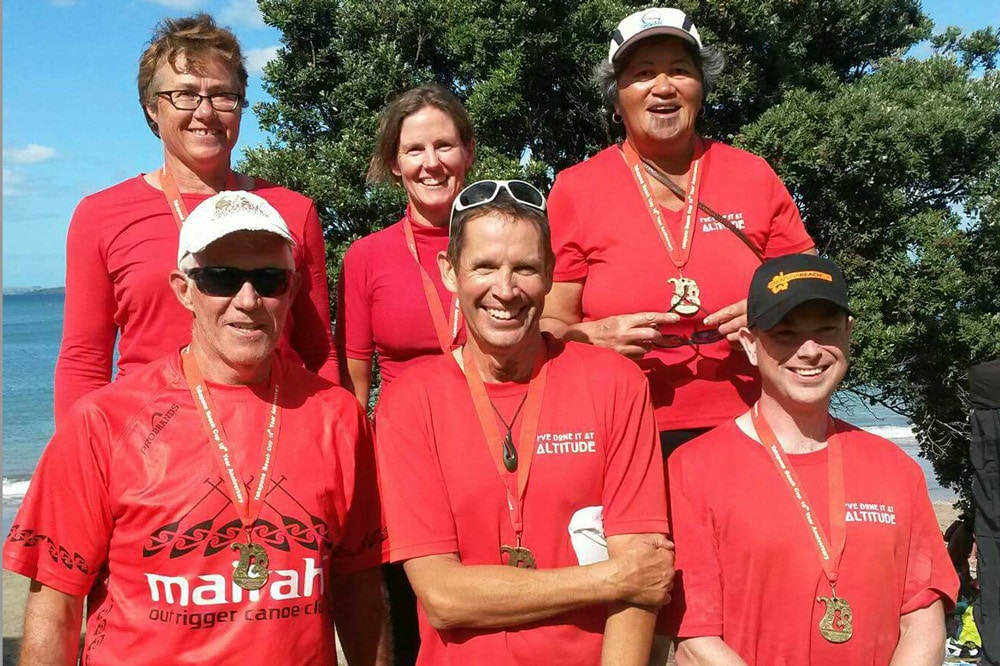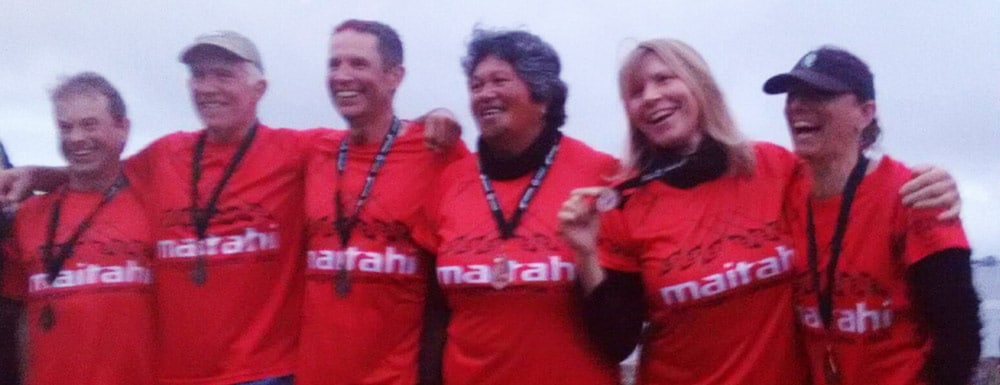Waka ama crews in New Zealand are normally 6 people who come together for social or racing events in 6 man outrigger canoes (OC6 or W6). Forming racing crews for waka ama racing can be a challenging task. If you are thinking of a race and want to get a crew together there are a few things to think about. Even social crews need to think about this.
Set the goal/intent at the very beginning so everyone is on the same page
The only way to get it to work is if everyone has a complete understanding of what they are committed to at the start. Nothing upsets crew dynamics more than an unclear intent or mixed intents. It really important right from the very start for all prospective crew members to know exactly what this particular crew is aiming for, what race and what is the desired outcome.
Some crews form to compete in a local race and the desired outcome its to get more racing experience and have a great time; to get on the podium would be great. Other crews will form to compete in a regional, national or international race and the desired outcome is to podium (i.e. come 1st, 2nd or 3rd).
If the intent is not spelled out in the very beginning and a consensus decision reached among the whole crew it can wreck your training programme.
If you have 100% commitment to the goal from all crew members then you won’t have a problem with motivation, either with individuals or the whole crew. Problems will come when maybe 4 are totally committed and 2 haven’t fully committed to the goals. The kind of commitment it takes to podium in s cometitive sport is “Whatever comes up we will come to practice; whatever the weather we will turn up; whatever physical condition we are in we will complete the race; we will not let the team down”.
Set a training schedule expectation
The type of training, its frequency and intensity depends entirely on your goal. At the very least there will be ‘on the water’ training as a whole crew. Setting expectations around attendance and the duration of sessions are vital. There is no point in 3 or 4 crew members showing up every time, on time, while the others constantly give excuses about why they can’t attend or arrive late.
Off the water training means different things to different people and for different types of racing
If the goals requires a higher level of fitness and there is to be off water training then it needs to be spelled out. Is the crew going to do this together, can they be flexible about their training programmes or do you expect them all to do the same thing at the same time.
I am currently in a crew that is spread from North Cape to the Bluff training for National Sprints so our opportunities to paddle together are limited. We get together once a month for a training camp. This requires juggling work, family and financial commitments. When we are together we work on working together (gelling) as a crew. We do the things that we can’t practice in a one man waka like turns.
In-between training camps time is spent doing our own on water and off water training. I am lucky enough to be able to train on the water with one of my crew members and other ‘waifs and strays’ who belong to crews with crew members spread around the country. It is no use turning up to a training camp without having done anything in between. Again it is disrespectful to my crew and to my coach.
Its hard work, my body aches some days. However, I know if I don’t get out there I will end up sitting on the couch again, reading books and looking longingly at the sea. Some days after a hard paddle I go home and have a nana nap.
Punctuality and respect
Once a training schedule has been agreed by the whole crew then it needs to be carried out. I am a sticker for punctuality because I regard that as a form of respect to my fellow crew members. This is especially true if my crew has a coach who will have taken time away from their own training to devote to my crew. Being on time (or even early) for practices, having the waka prepped and ready to go on the water on time, means we get the very best out of the time we spend together.
Awhi your crew members
In my experience lots of ‘stuff’ comes up when crews are training together, particularly for big races. There will be inter-personal challenges, personal challenges and whole crew challenges. It can come on all levels, emotional and physical. Showing awhi (caring), understanding and respect towards each other helps build strong crews.
Going to Outward Bound taught me a lot. We were told that if we had an issue with a fellow watch member it was best to put that out to the group while it was still a small pebble. If not these little irritations can explode into jolly great rocks – then it gets messy. The biggest thing is not to take it personally. Just trust the process. Sometimes there are things for the pebble thrower to learn, sometimes for the receiver and always for the group as a whole. The other thing we were taught was to have a ‘Courageous Conversation’ when the pebbles got larger or out of hand.
And then there is fundraising
Fundraising can be relentless. When you think you have finished on-the -water and off-the-water training then its time to started thinking about how to pay for everything. For bigger trips to be accessible, especially overseas trips, fundraising is a must. It can be all sorts of things from organising a movie night and selling tickets, selling raffle tickets, doing sausage sizzles or putting in funding applications. The crew needs to be very clear on who the money is being raised for. Is it the whole crew, does it include the coach, what about supporters? These are all crew decisions and need to be very clear so that everyone is on the same page.
Social interactions on and off the water
A good crew will interact as well off the water as on the water. Having training camps is a good way to find out how the crew dynamic is going. Is everyone pulling their weight in preparing food or cleaning up. What are the conversations like? You can tell a lot about crew dynamics by watching and listening while meals are being prepared.
So good luck with your crew. Set the intention, the goal, the training programme and then enjoy the ride.

On the podium winning gold at Takapuna Beach cup in the mixed masters iron 36km race 2016 is a Maithai crew.
From left: Pete Bywater, Tony Davies, Seb Head, Second row Karen Clark, Emma Fisher, Rongomai Flavell
